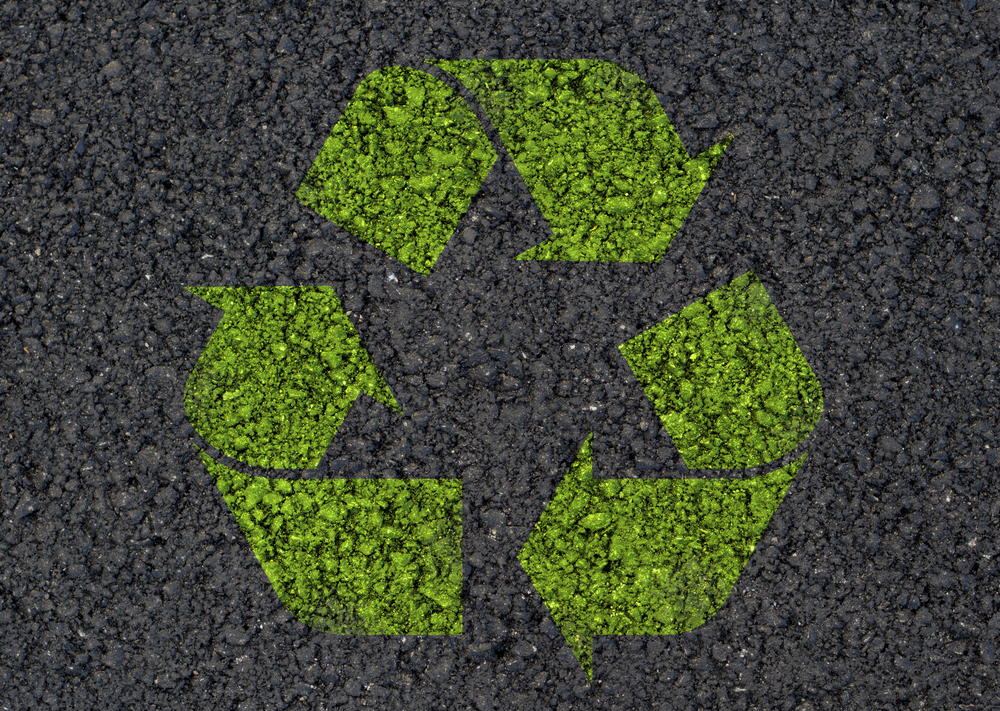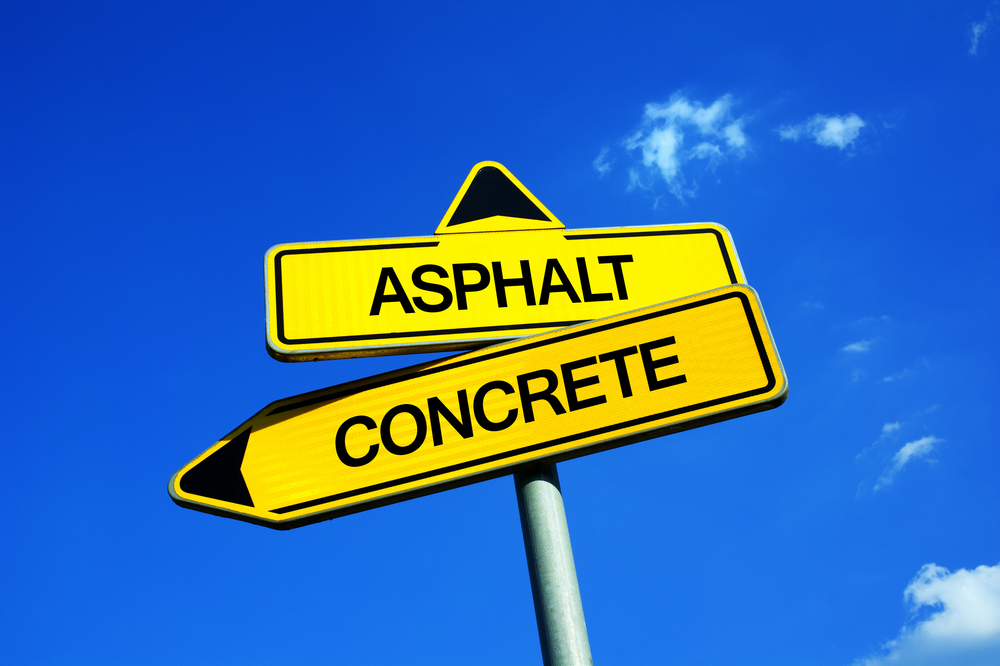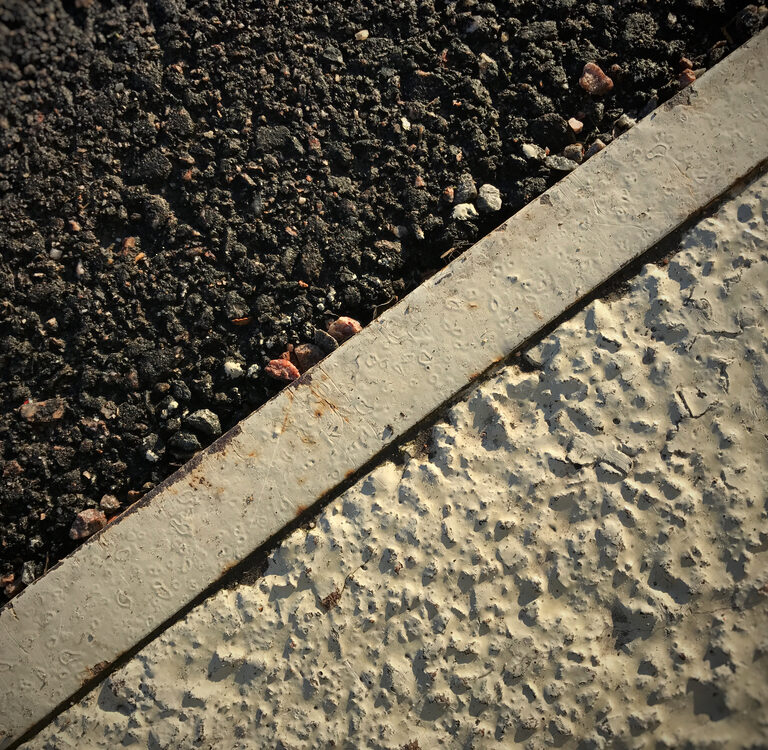There are certain sides you always knew you’d have to take in this ruthless, cutthroat world. Coke vs. Pepsi. Marvel vs. DC. Spy vs. Spy.
But did you ever think you’d have to choose sides in the Great Driveway Wars? It’s true — there are two sides in this conflict, and you’re either Team Asphalt or Team Concrete.
While the battle may not be as serious as we’ve made it out to be here, if you’re putting in a new driveway, you will need to choose between the two. We’ll show you how to pick the right one for your home, so that your driveway is as smooth and perfect as you’ve always dreamed of.
Remember, though, that driveway materials are like Highlanders: there can be only one (unless your contractor really screwed up).
- What’s the Difference Between Concrete and Asphalt?
- Which Is Cheaper?
- Which Lasts Longer?
- Which Is More Attractive?
- Which Is More Environmentally Friendly?
- Which Is Better for Your Home’s Resale Value?
- Does Climate Matter?
- Are Concrete and Asphalt the Only Options?
- Which Is Better, Concrete or Asphalt?
- Final Thoughts
What’s the Difference Between Concrete and Asphalt?
Both asphalt and concrete are made of a mixture of sand and crushed stone. This mixture is called “aggregate.” If they’re both made of aggregate, though, why do they look so different?
The answer is in what binds the aggregate together. Asphalt uses a black, petroleum-based binding agent that’s poured hot in one continuous slab and smoothed over with a steamroller. The end result is a long black slab that’s often referred to as “blacktop” or “pavement.”
Concrete, on the other hand, binds its aggregate with cement. This allows it to be poured cold, and it’s usually poured in sections rather than as a single slab. It takes longer to set, as you’ll usually have to wait several days for it to be finished (whereas asphalt can be ready in 24 hours or less).
Which Is Cheaper?
Asphalt is considerably cheaper than concrete, as it only costs around $2 per square foot, while concrete costs $5. The materials necessary to create an asphalt driveway are about a third as expensive as those needed for a concrete driveway.
Labor costs are usually around twice as much for concrete as well, so the money adds up quickly. That’s partially due to the fact that concrete takes so much longer to pour and set.
If you have the skills, you can save money by doing the installation yourself, of course. Still, while you won’t spend as much in labor costs, you will spend more of your time. It’s up to you how much your time is worth.
Which Lasts Longer?
Assuming both are properly installed (not that we’re doubting your skills), a concrete driveway will last for about 30 to 40 years, while an asphalt model will have a lifespan of about 20 years.
Those numbers are also assuming that you keep up with the required maintenance. Asphalt needs periodic resealing — usually every 3 to 5 years or so.
You don’t have to maintain concrete at all, but it’s much harder (and more expensive) to repair if it gets damaged. You can simply repave the top, damaged layer of an asphalt driveway, whereas you might need to replace the entire affected section of concrete.
Plant and tree roots find it easier to work their way through asphalt as well, making it more likely to crack than concrete.
Which Is More Attractive?
The answer to this is somewhat subjective, but concrete is typically considered more attractive. That’s why so many people choose it, even though it’s significantly more expensive.
You can get concrete in an assortment of colors, as there are dyes, powders, and stains that allow you to tint it the desired shade. You can also tint asphalt, but you’re basically limited to Earth tones.
You can also stamp concrete so that it looks like other materials, such as brick or stone. This gives you more design options, and can allow you to dress up your driveway while also saving money.
Of course, adding color or stamping to your concrete will drive up the price, so factor that into your budget.
Concrete also allows you to use decorative borders, whereas most asphalt driveways have unfinished edges. They just kind of… stop, tapering off into the street. You can add a concrete curb to dress the edges up, but that will increase your costs accordingly.
Which Is More Environmentally Friendly?

Neither one is especially friendly to Mother Nature, but concrete has a slight edge here.
Both materials can be recycled, but they both use non-sustainable natural resources. Asphalt is also made with petroleum-based products and releases evaporative oils in extreme heat, both of which will increase your carbon footprint.
Concrete has a longer lifespan as well, which is better for the planet.
However, certain types of asphalt are water-permeable, allowing moisture to sink back into the soil. WIth concrete, all that water runs into the drains, where it’s often wasted.
Which Is Better for Your Home’s Resale Value?
As mentioned previously, most people consider concrete to be more attractive, so it increases your home’s resale value more than asphalt does. The longer lifespan also helps in that regard.
If you go wild and put in a custom, decorative concrete driveway, that can drive up your home’s value even more. Will it be enough to offset the increased costs? We can’t say for certain, but it should be close — and you’ll get to enjoy a gorgeous driveway until you’re ready to sell.
Does Climate Matter?
Yes. Asphalt is a much more flexible material, so it can withstand extremely cold temperatures better than concrete, which is vulnerable to cracking when the mercury drops.
However, if you live in an area that’s prone to extreme heat, you may want to go with concrete. Asphalt gets very tacky in the heat, and it can stick to the bottom of your shoes, staining them or causing them to stain your carpet.
Tires can also harm asphalt in the extreme heat, but de-icing materials can damage concrete in the cold, so it’s a bit of a wash there.
Are Concrete and Asphalt the Only Options?
No, there are other materials that are often used for driveways. Concrete and asphalt are generally considered middle-of-the-road (middle-of-the-driveway?) materials.
On the low end, you’ll find gravel, which is easy to install and comes in different colors. It requires frequent maintenance, though, and it doesn’t do well in snowy climates.
If you want something more elegant, you can go with brick or paver tiles. These are more expensive than concrete or asphalt, but they’re generally considered much more attractive, and they’ll last 40 years or more.
Which Is Better, Concrete or Asphalt?
Unless you live in an extremely cold area, concrete is usually the superior material. It lasts longer, looks better, and boosts your home’s resale value.
That’s not to say that asphalt is without its advantages, though. It’s easier to install and maintain, and it costs significantly less.
There’s nothing wrong with either material, of course, and either one can be used to make a beautiful, durable driveway. It’s up to you whether you’re willing to spend more to boost your home’s curb appeal.
Final Thoughts

Both asphalt and concrete make excellent materials for any driveway, and your home will stand out from all the others on your street regardless of which you choose. However, there are a few key differences that could make one or the other a better choice for your particular situation.
In the end, though, all that matters is that both Team Asphalt and Team Concrete rise up to do battle with Team Dirt Road. Those guys can’t be trusted.
